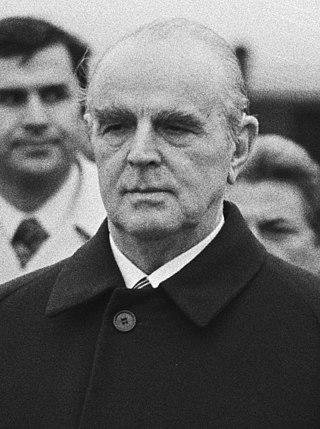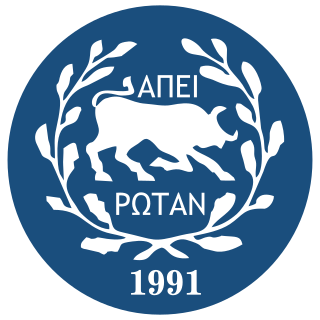
The Christian Social Union in Bavaria is a Christian democratic and conservative political party in Germany. Having a regionalist identity, the CSU operates only in Bavaria while its larger counterpart, the Christian Democratic Union (CDU), operates in the other fifteen states of Germany. It differs from the CDU by being somewhat more conservative in social matters, following Catholic social teaching. The CSU is considered the de facto successor of the Weimar-era Catholic Bavarian People's Party.

Konstantinos G. Karamanlis, commonly anglicised to Constantine Karamanlis or just Caramanlis, was a four-time Prime Minister of Greece and two-term president of the Third Hellenic Republic. A towering figure of Greek politics, his political career spanned portions of seven decades, covering much of the latter half of the 20th century.

The Democratic Social Movement is a social-democratic political party in Greece. The party was founded in 1995 by Dimitris Tsovolas and several ex-members of the Panhellenic Socialist Movement (PASOK), the then ruling social-democratic party.

The Democratic Party of Albania is a conservative political party in Albania. It has been the largest opposition party in the country since 2013.

The Panhellenic Socialist Movement, known mostly by its acronym PASOK, is a social-democratic political party in Greece. Until 2012 it was one of the two major parties in the country, along with New Democracy, its main political rival.

The Catholic People's Party was a Catholic Christian democratic political party in the Netherlands. The party was founded in 1945 as a continuation of the interwar Roman Catholic State Party, which was in turn a successor of the General League of Roman Catholic Caucuses. The party was in government throughout its existence. In 1977, a federation of parties including the Catholic People's Party, the Anti-Revolutionary Party (ARP) and the Christian Historical Union (CHU) ran together under the Christian Democratic Appeal (CDA) banner. The three participating parties formally dissolved to form the CDA in 1980.

Spyridon "Spyros" Markezinis was a Greek politician, longtime member of the Hellenic Parliament, and briefly the Prime Minister of Greece during the aborted attempt at metapolitefsi (democratization) of the Greek military regime in 1973.
Venizelism was one of the major political movements in Greece from the 1900s until the mid-1970s.

The Centre Union was a major centrist political party in Greece, created in 1961 by Georgios Papandreou.

The Italian Liberal Party was a liberal political party in Italy.
The National Radical Union was a Greek political party formed in 1956 by Konstantinos Karamanlis, mostly out of the Greek Rally party.

The People's Party or Populist Party was a conservative and pro-monarchist Greek political party founded by Dimitrios Gounaris, the main political rival of Eleftherios Venizelos and his Liberal Party. The party existed from 1920 until 1958.
The terms Apostasia or Iouliana or the Royal Coup are used to describe the political crisis in Greece centered on the resignation, on 15 July 1965, of Prime Minister Georgios Papandreou and subsequent appointment, by King Constantine II, of successive prime ministers from Papandreou's own party, the Centre Union, to replace him. Defectors from the Center Union were branded by Papandreou's sympathizers as Apostates ("renegades"). The Apostasia heralded a prolonged period of political instability, which weakened the fragile post-civil war order, and ultimately led to the establishment of the military regime in April 1967.
Parliamentary elections were held in Greece on 19 February 1956. The result was a victory for Konstantinos Karamanlis and his National Radical Union (ERE) by securing the electoral vote despite trailing in the popular vote, due to gerrymandering employed by ERE. It was the first general election in Greece in which women had the right to vote although women had first voted in a by-election in Thessaloniki Prefecture in 1953 in which the first female MP was elected.
Parliamentary elections were held in Greece on 3 November 1963. They resulted in a narrow victory for the Center Union of Georgios Papandreou after three consecutive victories of Konstantinos Karamanlis and his National Radical Union and after 11 years, during which the conservative parties ruled Greece.
Parliamentary elections were held in Greece on 16 February 1964. They resulted in a clear victory for Georgios Papandreou and his Center Union (EK). Papandreou subsequently formed the 37th government since the end of World War II.

The National Progressive Centre Union was a Greek Venizelist political party. It was founded in 1950 by Nikolaos Plastiras, and formed a government with other Centrist parties after the 1950 legislative election. It later formed another coalition government after the resignation of Sofoklis Venizelos as Prime Minister, and another one in 1951 with Venizelos. After Plastiras's death in 1953, the party continued to exist, but was subsumed into the Centre Union in 1961.

The Democratic Union of the Greek Minority – OMONOIA, better known by its short name Omonoia, is a social, political and cultural organization in Albania that promotes minority rights for the Greek minority in the south of the country.

National Democratic Union was a Greek political party. The party was founded in 1974 by Petros Garoufalias, a former member of the Centre Union. The party was founded in order to represent the royalists and supporters of the recently deposed junta.

















